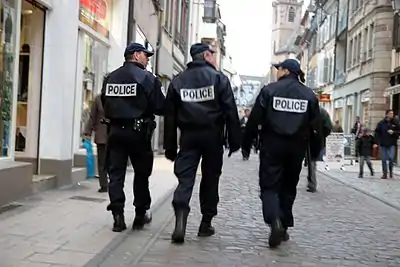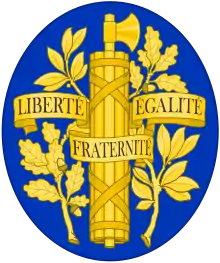Crime in France
Crime in France is combated by a range of French law enforcement agencies.

Crime by type
Murder
Though France's homicide rate fluctuated substantially in recent years, it tended to decrease through 2000 - 2014 period ending at 1.2 cases per 100,000 population in 2014.[1]
Many terrorist attacks have occurred in France, especially from the mid-1970s onwards. These include the 1995 France bombings, January 2015 Ile-de-France attacks, the November 2015 Paris attacks, the 2016 Magnanville stabbing, the 2016 Nice truck attack, the 2016 Normandy church attack, and the 2018 Paris knife attack. These attacks have been one of the reasons for the homicide rate fluctuation after 2014.
In September 2018, a police chief was stabbed to death in the city of Rodez. "The attacker was known to police. He had defaced the city hall door on 11 April," said Christian Teyssèdre, the Mayor of Rodez.[2]
On 31 August 2019, a 19-year-old man was stabbed to death and eight others wounded, in Villeurbanne, Lyon. Two men, with a knife and a skewer, carried out the attack.[3]
On 29 October 2020, Mayor Christian Estrosi said that 3 people were killed and several more were wounded in a suspected terror attack inside the Notre Dame Basilica church in the French city of Nice. Officials claim that the was a terror attack.[4]
Rape
In 1971, the rape rate stood at 2.0 per 100,000 people.[5] While in 1995, it was 12.5.[6] In 2009, it stood at 16.2.[7] According to a 2012 report, about 75,000 rapes take place each year.[8]
According to a 2014 article, about 5,000 to 7,000 of the rapes are gang rapes.[9]
Organized crime
The Milieu is a category of organized criminals operating in France. These groups are quite often not ethnically French. Criminal groups associated with the Milieu work in every major city in France, but are mostly concentrated in Marseille, Grenoble, Paris, and Lyon.[10]
Corruption
In 2011, Transparency International concluded in its annual report for 2011 that France does not do enough to stop corruption.[11] A TNS Sofres poll in October 2011 indicated that 72% of the French public had the perception that politicians are corrupt.[12]
By location
Priority Security Zones
In August 2012, the French Government announced the creation of fifteen "Priority Security Zones"' in an effort to target crime hotspots. Extra police, riot police, detectives and members of the intelligence services are to be mobilised. Social services, educational bodies and charities also put extra resources into the selected areas.
The Neuhof area of Strasbourg was selected because of a need to tackle violent crime, and the historic rural town of Chambly to the north of Paris is being focused on because of rising burglary rates and car theft. The northern quarter of Amiens in the Somme region and areas of Seine-Saint-Denis to the north of Paris, which witnessed fierce rioting in 2005, are priority zones because of widespread drug dealing and a rampant black market.[13]
Paris
Violent crime is relatively uncommon in the city centre. Pickpockets are the most significant problem and are commonly children under the age of 16 because they are difficult to prosecute. Pickpockets are very active on the rail link from Charles de Gaulle Airport to the city centre.
The Paris Police Prefecture publishes a pamphlet entitled "Paris in Complete Safety" that provides practical advice and useful telephone numbers for visitors. In an emergency, dialling 17 will connect the caller to the police. You can also dial the Europe-wide emergency response number 112 to reach an operator for any kind of emergency service (similar to the U.S. and Canadian 911 system). Non-French speakers may experience a delay while an English speaker is located.
In 2014, thousands of demonstrators protested the Israeli-Gaza conflict for over a week. During several instances rioters shouted anti-Semitic chants and attacked Jews while ransacking Jewish synagogues and Jewish-owned businesses.[14] Large demonstrations in Paris are generally managed by a strong police presence, but such events have the potential to become dangerous. Likewise, some sporting events, such as soccer matches, have occasionally degenerated into violence have continued into the streets.
In 2017, a Russian performance artist was detained in Paris after setting fire to the front of a branch of France's central bank,[15] [13], On the third of October, in an affluent neighbourhood near the Paris Saint-Germain's football ground, the police found four gas canisters doused with petrol and wired to connect to a mobile phone.[16] The government has suspected bomb-making equipment found and arrests have been made in France and Spain [17]
References
- "homicide rate". knoema.
- "Police chief stabbed to death in southern France". BBC News. Retrieved 27 September 2018.
- "One dead, eight wounded in French knife attack". Borneo Post Online. Retrieved 2 September 2019.
- "One woman decapitated and two others dead in suspected 'terror' attack in Nice". The Telegraph. Retrieved 29 October 2020.
- Veeraraghavan, Vimala (1987). Rape and Victims of Rape: A Socio-psychological Analysis. Northern Book Centre.
- Simon, Rita James. A Comparative Perspective on Major Social Problems. Lexington Books. pp. 20–21.
- "Statistics : Crime : Sexual Violence". Unodc.org. Retrieved 4 December 2013.
- "Light Gang Rape Penalties Provoke Outcry in France". 11 October 2012.
- "Tournantes: le calvaire de Nina et Stéphanie". L'Express. Retrieved 10 April 2014.
- Lalam, Nacer, "How organised is organised crime in France?" in Organised Crime in Europe: Concepts, Patterns and Control Policies in the
- "Corruption watchdog says France could do better", Radio France Internationale, 6 September 2012.
- "Bad smells", The Economist, 1 October 2011.
- "France to launch crackdown on 15 crime 'hot spots'", France 24, 6 August 2012.
- "Banned Gaza protest in Paris suburb turns violent, again", France 24, 21 July 2014.
- "Artist set fire to banks in Paris". euronews.
- "Five arrested over homemade bomb found near Paris stadium". euronews.
- "Anti-terror operations in Europe". euronews.
